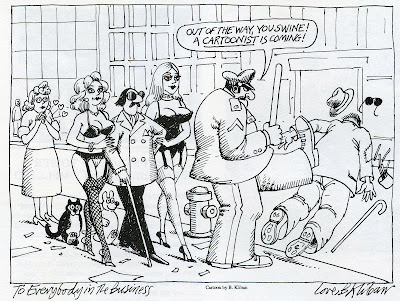THE CARTOONIST'S REVENGE
Everyone knows what it takes to have a successful career. A college education is essential. A graduate degree is even better (preferably in a field such as technology, business or finance). You have to dress for success, build a network of important contacts, and cultivate the Seven Habits of Highly Effective People. Language proficiency in Chinese wouldn't hurt.
But on the other hand, if you have none of these you might try sitting alone in a ratty T shirt and drawing doodles. When you lack the necessary credentials, or even basic literacy, a simple line can still be The Great Equalizer.
Cartoonist Thomas Nast could scarcely read or write but he had a greater impact than all the lawyers, accountants, famous writers and powerful government officials combined in bringing down the corrupt politicians who controlled New York. Nast's drawings resonated with the public and knocked the Tweed politicians off their throne. He also created many popular symbols, such as the Republican elephant and Democratic donkey, and influenced presidential elections. (Nast's wife Sarah corrected the spelling in his captions). Nast became so wealthy from his drawings that he was able to hire scholars to read to him from Shakespeare, Dickens, and Twain as he worked.
David Low was born in a small remote town in New Zealand. He had little money, no contacts and left school at a young age. Yet, the lines he drew had an impact on international relations. Hitler was enraged by Low's biting drawings, and the Nazi government formally protested to the British government. After the war, Winston Churchill protested that Low's cartoons about a politically sensitive situation should be censored for the sake of "western democracy."
Albert Dorne never made it past 7th grade. A sickly child, born in the most brutal poverty and squalor, he leveraged a knack for drawing into great wealth, prestige and influence. Dorne went on to fill many roles, as the head of a multinational corporation, a lecturer, author and instructor. He consorted with movie stars and senators. But each step of the way it was his drawing that made everything possible.
Jeff MacNelly dropped out of college but his brilliant drawings gave him influence with a huge audience that was the envy of career politicians and policy experts. When he won his first Pulitzer prize at age 25, MacNelly said he was hanging the certificate high on his wall to fool visitors into thinking it was a college degree.
In the last few years there have been several incidents where drawings of the prophet Muhammad have upset the balance of international relations, inspiring wild mobs to riot, kill, invade and burn down embassies.
Cartoonists may not be paid the way investment bankers are paid. They don't get preferential treatment in fancy restaurants the way movie stars do, or command armies the way political leaders do. They mostly dress like slobs. But in their ability to make a line on paper, they still have the means to shake up the world.
But on the other hand, if you have none of these you might try sitting alone in a ratty T shirt and drawing doodles. When you lack the necessary credentials, or even basic literacy, a simple line can still be The Great Equalizer.
Cartoonist Thomas Nast could scarcely read or write but he had a greater impact than all the lawyers, accountants, famous writers and powerful government officials combined in bringing down the corrupt politicians who controlled New York. Nast's drawings resonated with the public and knocked the Tweed politicians off their throne. He also created many popular symbols, such as the Republican elephant and Democratic donkey, and influenced presidential elections. (Nast's wife Sarah corrected the spelling in his captions). Nast became so wealthy from his drawings that he was able to hire scholars to read to him from Shakespeare, Dickens, and Twain as he worked.
 |
| David Low: the Nazis shovel more troops into Stalingrad |
David Low was born in a small remote town in New Zealand. He had little money, no contacts and left school at a young age. Yet, the lines he drew had an impact on international relations. Hitler was enraged by Low's biting drawings, and the Nazi government formally protested to the British government. After the war, Winston Churchill protested that Low's cartoons about a politically sensitive situation should be censored for the sake of "western democracy."
 |
| Albert Dorne, from the Famous Artists School materials |
Albert Dorne never made it past 7th grade. A sickly child, born in the most brutal poverty and squalor, he leveraged a knack for drawing into great wealth, prestige and influence. Dorne went on to fill many roles, as the head of a multinational corporation, a lecturer, author and instructor. He consorted with movie stars and senators. But each step of the way it was his drawing that made everything possible.
 |
| The great Jeff MacNelly captures President Carter's dilemma |
Jeff MacNelly dropped out of college but his brilliant drawings gave him influence with a huge audience that was the envy of career politicians and policy experts. When he won his first Pulitzer prize at age 25, MacNelly said he was hanging the certificate high on his wall to fool visitors into thinking it was a college degree.
In the last few years there have been several incidents where drawings of the prophet Muhammad have upset the balance of international relations, inspiring wild mobs to riot, kill, invade and burn down embassies.
Cartoonists may not be paid the way investment bankers are paid. They don't get preferential treatment in fancy restaurants the way movie stars do, or command armies the way political leaders do. They mostly dress like slobs. But in their ability to make a line on paper, they still have the means to shake up the world.





